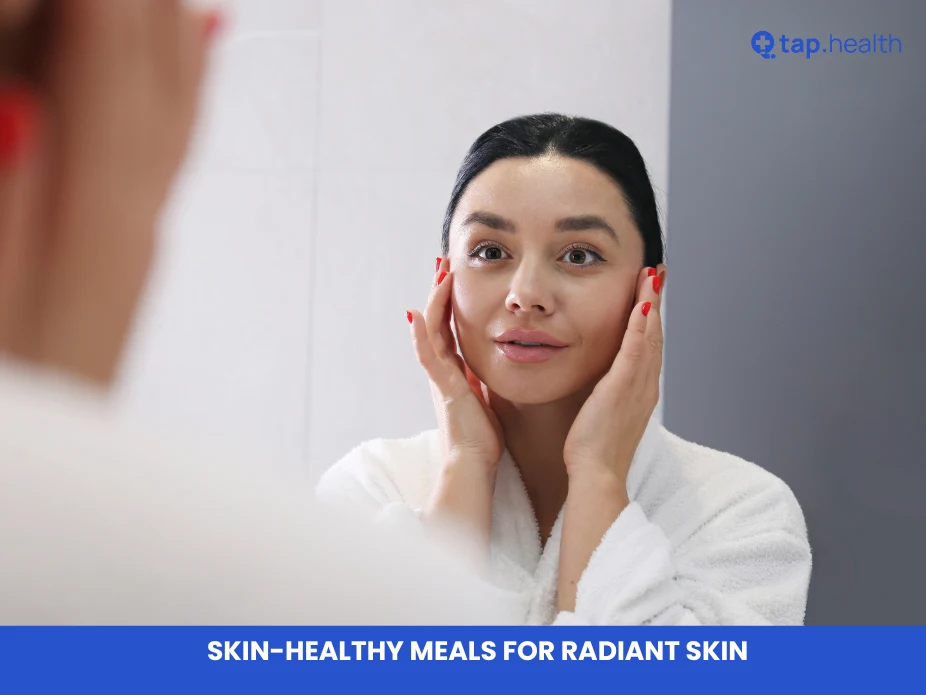Everyone dreams of having radiant, glowing skin. While skincare products can help, what you eat plays a crucial role in your skin’s health. Eating the right foods can nourish your skin from the inside out, giving you that natural, healthy glow. In this blog, we’ll explore skin-healthy meals for radiant skin, share real-life scenarios, expert insights, and provide easy-to-follow recommendations backed by research. Let’s dive in!
Why Your Diet Matters for Your Skin
Your skin is your body’s largest organ, and it reflects your overall health. The food you consume supplies essential nutrients that help maintain your skin’s structure, elasticity, and hydration. A balanced diet rich in vitamins, minerals, and antioxidants can protect your skin from damage, reduce signs of aging, and promote a clear complexion.
Key Nutrients for Healthy Skin
- Vitamin C: Helps in collagen production and protects against sun damage.
- Vitamin E: Acts as an antioxidant, preventing skin cell damage.
- Omega-3 Fatty Acids: Reduce inflammation and keep skin moisturized.
- Antioxidants: Fight free radicals that cause premature aging.
- Zinc: Helps in healing wounds and controlling oil production.
Top Skin-Healthy Foods to Include in Your Diet
1. Fatty Fish
Fatty fish like salmon, mackerel, and sardines are rich in omega-3 fatty acids. These healthy fats help maintain your skin’s moisture barrier, keeping it hydrated and supple. Omega-3s also reduce inflammation, which can help prevent acne and other skin issues.
Real-Life Scenario:
Sarah, a 28-year-old graphic designer, struggled with dry and flaky skin. After adding salmon to her diet twice a week, she noticed her skin became smoother and more hydrated within a few weeks.
2. Avocados
Avocados are packed with healthy fats, vitamins E and C, and antioxidants. They help protect your skin from oxidative damage and keep it moisturized. Avocados also contain biotin, which is essential for healthy skin, hair, and nails.
3. Nuts and Seeds
Almonds, walnuts, chia seeds, and flaxseeds are excellent sources of vitamins, minerals, and healthy fats. They provide essential nutrients that support skin elasticity and hydration. Nuts and seeds are also rich in antioxidants, which help fight free radicals.
4. Sweet Potatoes
Sweet potatoes are loaded with beta-carotene, which the body converts into vitamin A. Vitamin A is crucial for skin repair and maintenance. It also acts as a natural sunblock, protecting your skin from harmful UV rays.
5. Green Tea
Green tea is rich in polyphenols, which are powerful antioxidants. These compounds help protect the skin from damage, reduce inflammation, and improve overall skin texture. Drinking green tea regularly can contribute to a clearer and more youthful complexion.
6. Berries
Berries like blueberries, strawberries, and raspberries are high in antioxidants and vitamin C. They help protect the skin from free radical damage, promote collagen production, and improve skin elasticity.
7. Dark Chocolate
Dark chocolate with at least 70% cocoa content is a great source of antioxidants. It helps protect the skin from UV damage, improves blood flow, and hydrates the skin. Enjoying dark chocolate in moderation can contribute to healthier skin.
Expert Contributions
Dr. Emily Thompson, a dermatologist at the Skin Health Institute, emphasizes the importance of a balanced diet for maintaining healthy skin. She states, “What you eat significantly impacts your skin’s appearance and health. Incorporating a variety of nutrient-rich foods can prevent common skin issues and promote a radiant complexion” Skin Health Institute.
Recommendations Grounded in Proven Research and Facts
Incorporate a Variety of Fruits and Vegetables
Eating a colorful array of fruits and vegetables ensures you get a wide range of vitamins and antioxidants. Aim for at least five servings a day to provide your skin with the necessary nutrients for repair and protection.
Stay Hydrated
Water is essential for maintaining skin hydration and elasticity. Aim to drink at least eight glasses of water a day to keep your skin looking plump and healthy.
Limit Sugar and Processed Foods
High sugar intake can lead to inflammation and the breakdown of collagen, resulting in premature aging. Reducing your consumption of sugary and processed foods can improve your skin’s texture and appearance.
Choose Whole Grains
Whole grains provide essential nutrients and fiber that support overall health, including skin health. They help regulate blood sugar levels, reducing the risk of acne and other skin issues.
Include Lean Proteins
Lean proteins like chicken, turkey, and legumes provide the building blocks for skin repair and regeneration. They are essential for maintaining skin elasticity and firmness.
Real-Life Scenarios
Case Study 1: Mark’s Transformation
Mark, a 35-year-old teacher, struggled with adult acne and dull skin. After consulting with a nutritionist, he incorporated more fatty fish, nuts, and green tea into his diet while reducing his intake of dairy and sugary snacks. Within three months, Mark saw a significant improvement in his skin clarity and radiance.
Case Study 2: Lisa’s Glowing Skin
Lisa, a 22-year-old college student, wanted to enhance her natural glow without relying heavily on skincare products. She started adding berries, dark chocolate, and avocados to her daily meals. Not only did her skin become more vibrant, but she also felt more energized and healthier overall.
Factual and Reliable Information
Studies have shown that a diet rich in antioxidants, vitamins, and healthy fats can significantly improve skin health. For example, a study published in the Journal of Dermatology found that participants who increased their intake of omega-3 fatty acids experienced fewer inflammatory skin conditions and improved skin moisture levels Journal of Dermatology.
Another research published in Nutrients highlighted the benefits of antioxidants in protecting the skin from oxidative stress and reducing signs of aging Nutrients Journal.
Easy and Delicious Skin-Healthy Meal Ideas
Breakfast: Berry Smoothie Bowl
Ingredients:
- 1 cup mixed berries (blueberries, strawberries, raspberries)
- 1 banana
- 1/2 avocado
- 1 cup spinach
- 1 tablespoon chia seeds
- 1 cup almond milk
Instructions:
- Blend all ingredients until smooth.
- Pour into a bowl and top with additional berries, nuts, and a drizzle of honey.
- Enjoy a nutrient-packed start to your day!
Lunch: Quinoa and Salmon Salad
Ingredients:
- 1 cup cooked quinoa
- 1 grilled salmon fillet
- 1/2 avocado, sliced
- 1 cup mixed greens
- 1/4 cup cherry tomatoes
- 2 tablespoons olive oil
- 1 tablespoon lemon juice
- Salt and pepper to taste
Instructions:
- In a large bowl, combine quinoa, mixed greens, cherry tomatoes, and avocado.
- Top with grilled salmon.
- Drizzle with olive oil and lemon juice, then season with salt and pepper.
- Toss gently and serve.
Dinner: Sweet Potato and Black Bean Tacos
Ingredients:
- 2 medium sweet potatoes, diced
- 1 can black beans, drained and rinsed
- 1 tablespoon olive oil
- 1 teaspoon cumin
- 1 teaspoon paprika
- 8 whole-grain tortillas
- 1/2 cup salsa
- 1/4 cup chopped cilantro
- Lime wedges for serving
Instructions:
- Preheat oven to 400°F (200°C).
- Toss sweet potatoes with olive oil, cumin, and paprika. Spread on a baking sheet and roast for 25 minutes.
- In a pan, heat black beans until warm.
- Warm tortillas in a skillet.
- Assemble tacos with roasted sweet potatoes, black beans, salsa, and cilantro.
- Serve with lime wedges.
Frequently Asked Questions (FAQ) on Skin-Healthy Meals for Radiant Skin
1. What are the best foods for glowing skin?
Answer:
Foods rich in antioxidants, vitamins C and E, omega-3 fatty acids, and healthy fats are excellent for glowing skin. Examples include fatty fish, berries, nuts, avocados, and green tea.
2. Can diet really affect my skin’s appearance?
Answer:
Yes, your diet plays a significant role in your skin’s health. Consuming nutrient-rich foods can improve skin hydration, reduce inflammation, and promote collagen production, leading to a healthier complexion.
3. How much water should I drink for healthy skin?
Answer:
Aim to drink at least eight glasses of water a day. Staying hydrated helps maintain skin elasticity and prevents dryness.
4. Are there any foods I should avoid for better skin?
Answer:
Limiting sugary and processed foods can help prevent inflammation and reduce the risk of acne and premature aging.
5. How long does it take to see skin improvements from dietary changes?
Answer:
Results can vary, but many people notice improvements in their skin within a few weeks to a couple of months of making positive dietary changes.
Conclusion
Achieving radiant skin doesn’t have to be complicated. By incorporating skin-healthy meals for radiant skin into your daily routine, you can nourish your skin from the inside out. Focus on a balanced diet rich in vitamins, minerals, and antioxidants, stay hydrated, and avoid excessive sugar and processed foods. Remember, healthy skin starts with what you eat!
For more tips on maintaining healthy skin through diet, check out these skin health resources.
References:



